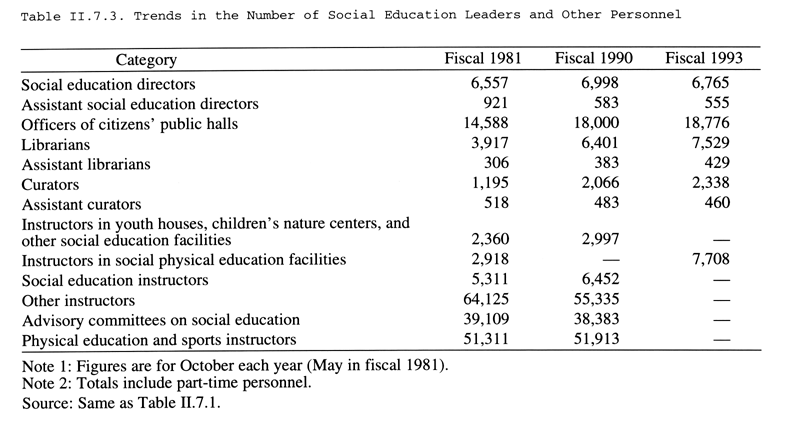| Home > Policy > White Paper, Notice, Announcement > White Paper > JAPANESE GOVERMENT POLICICIES IN EDUCATION, SCIENCE AND CULTURE 1994 > PART II Chapter 7 Section 6 2 | ||
People providing guidance in social education include social education directors and officers of citizens' public halls, as well as librarians, museum curators, social education leaders providing instruction in various fields of social education at the municipal and other levels, and leaders of social education groups. Guidance is also provided by a significant number of people working in various private-sector organizations, such as culture centers.
Social education directors are employed in the secretariats of boards of education to provide specialized and technical guidance and advice about social education management. All prefectures and cities and all municipalities with populations of at least 10,000 are required to appoint social education directors. The appointment ratios in fiscal 1990 were 100% for prefectures, 95% for cities and for municipalities with populations of at least 10,000, and 91% for municipalities with populations under 10,000. Social education directors will play an increasingly important role in the promotion of social education in the future because of their central role in this field, and ideally directors should be appointed by all cities and municipalities.
The Ministry of Education, Science and Culture partially subsidizes the social education directors dispatch system, under which prefectural governments assign social education directors at the request of municipalities. Since the establishment of this system the Ministry has been promoting the appointment of social education directors by municipalities ( Table II.7.3 ).

The central government, prefectural governments, and municipalities provide a variety of training programs to develop and improve the caliber of social education leaders. The Ministry of Education, Science and Culture provides training for social education directors. The National Education Center's Training Institute of Social Education and universities have been commissioned to provide courses leading to the acquisition of qualifications for this position.
The Ministry also provides advanced, national-level training for administrative personnel in the secretariats of boards of education and for personnel of social education facilities, such as citizens' public halls, libraries, and museums. The Ministry is enhancing the content of these courses, which are operated jointly with the Training Institute of Social Education. This institute has played an important role as the core training facility for those involved in social education. A priority from now on will be the enhancement of the institute's capabilities, including the development of capabilities that will enable it to function as a social education information center.
In fiscal 1992 a total of 690,000 people participated in training programs operated by prefectural and municipal boards of education. Approximately 80% of the participants were leaders employed by private-sector and other organizations. The Ministry of Education, Science and Culture provides subsidies for prefectural governments' training programs for social education directors and other leaders, for volunteers working in citizens' public halls, libraries, and museums, and for the development of human-resource databanks.
| Back to Top | MEXT HOME |